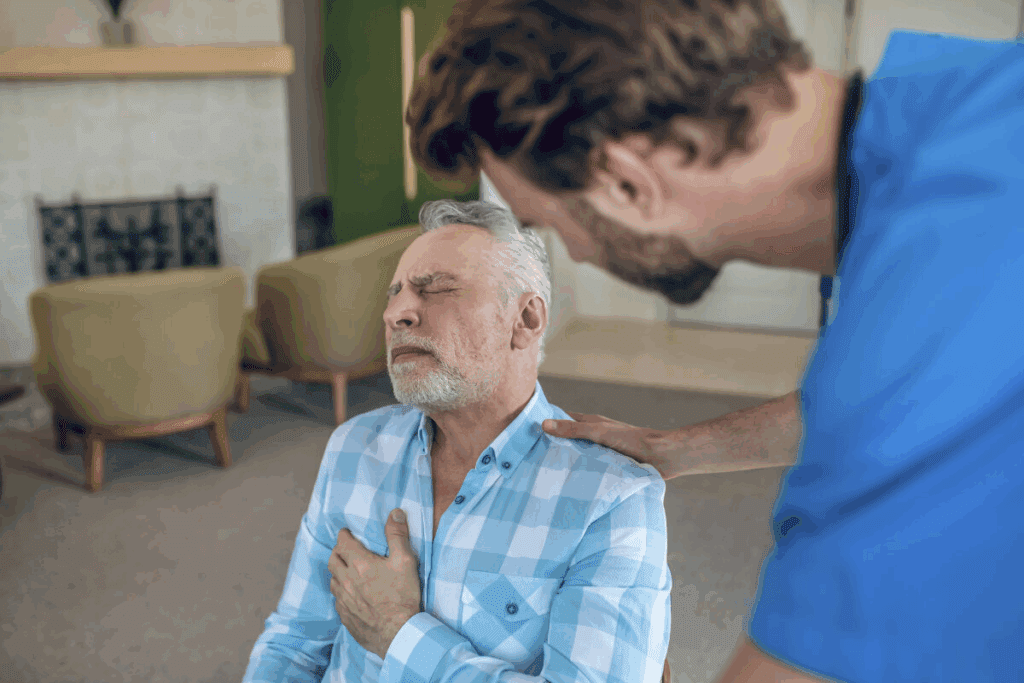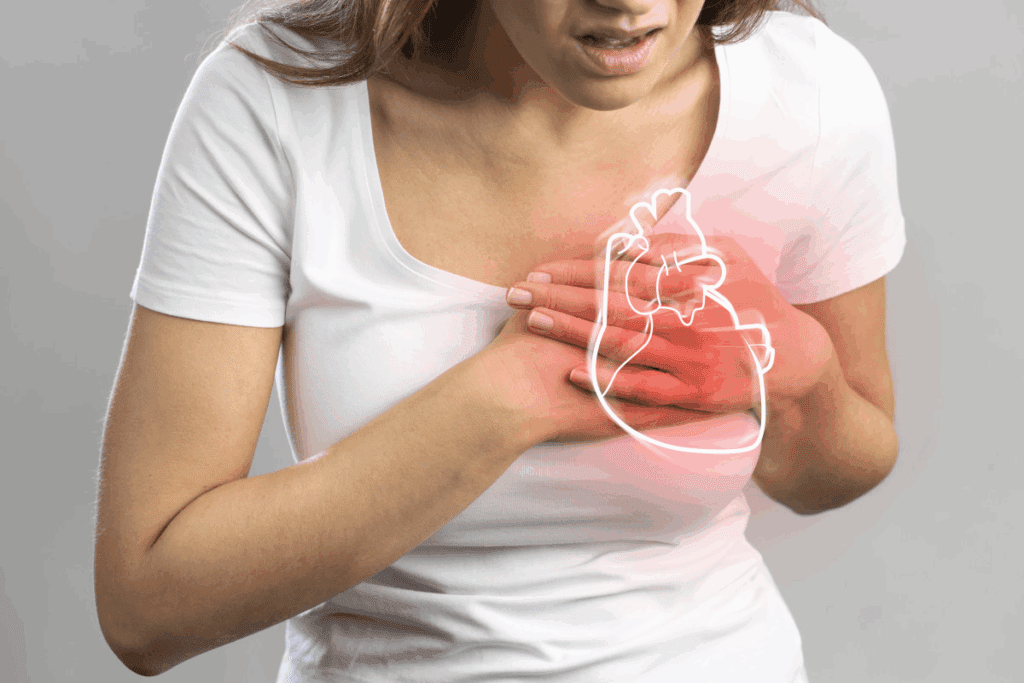Last Updated on November 25, 2025 by Ugurkan Demir

Unexplained chest pain and constant fatigue might signal serious heart problems. At Liv Hospital, we know how vital it is to spot these signs early. This way, we can offer the right care quickly.
Heart disease is called the “silent killer” because it shows up in many ways. Symptoms include shortness of breath and dizziness. Our skilled cardiologists aim to give top-notch care to all patients, including those from abroad.
We’re here to help you spot the signs that could save your life. Knowing the risks of heart problems helps you stay healthy. Take steps now to keep your heart in good shape.

Heart pain and tiredness are more than just a coincidence. They are key signs of heart health problems. If you feel both, it might mean you need to see a doctor right away.
Heart issues can make you feel very tired, even when you rest. This is common in angina, where the heart doesn’t get enough blood. “Angina is not just chest pain,” says a cardiologist at Liv Hospital. “It’s a sign your heart is not getting enough oxygen.”
Heart problems can make you feel tired in different ways. When the heart doesn’t pump well, it can’t send enough oxygen to your body. This leads to feeling very tired.
Conditions like angina cause both chest pain and tiredness. This is because the heart can’t get the oxygen it needs. It’s important to know that this tiredness is not just from being tired after a long day. It’s a deep exhaustion that affects your daily life and doesn’t go away with rest.
Our cardiologists say, “If you’re tired all the time and have heart pain, you need to see a doctor. It could be a serious heart problem.”
Ignoring heart pain and tiredness can be very dangerous. These symptoms can mean serious heart problems like coronary artery disease or heart failure. Not treating them early can lead to serious health issues.
Heart pain and tiredness are not normal signs of aging or everyday life. They are warning signs for heart health problems. Seeing a doctor when you have these symptoms can help prevent bigger heart problems.
“The key to managing heart health is early detection and treatment. Don’t ignore the warning signs your body is sending.”
Knowing the link between heart pain and tiredness helps you take care of your heart. If you’re feeling these symptoms, talk to a doctor. They can find out why and what to do next.

Chest pain and extreme fatigue together are warning signs for heart problems. It’s important to know what these symptoms mean and how they can signal serious heart issues.
Cardiac fatigue is not the same as regular tiredness. While normal tiredness goes away with rest, cardiac fatigue stays and comes with other signs like chest pain. It’s key to tell them apart to get help quickly.
Normal tiredness gets better with rest and calm. But cardiac fatigue doesn’t and might mean a heart problem. If you’re tired and can’t shake it, see a doctor.
When you have chest pain and extreme fatigue, knowing when to go to the emergency room is critical. This mix can mean a heart attack or other serious heart issues.
Cardiologists say if you have chest pain that lasts, is very bad, or comes with other signs like being very tired, dizzy, or having trouble breathing, get help right away.
“If you’re experiencing chest pain and extreme fatigue, don’t hesitate to seek emergency care. It’s always better to err on the side of caution when it comes to your heart health.”
Liv Hospital Cardiologists
The table below shows the main differences between normal tiredness and cardiac fatigue, and when to go to the emergency room.
| Symptom | Normal Tiredness | Cardiac Fatigue |
| Relieved by Rest | Yes | No |
| Accompanied by Chest Pain | No | Often |
| Seek Emergency Care | No | Yes, if severe or with other symptoms |
Knowing the difference between normal tiredness and cardiac fatigue can save lives. If you’re not sure about your symptoms, always talk to a doctor.
Angina and exhaustion are linked because the heart struggles to work with less blood. Angina is when the heart doesn’t get enough blood, causing chest pain, shortness of breath, and tiredness. Knowing this link helps spot heart problems early.
When the heart muscle lacks oxygen-rich blood, it hurts and feels tired. This lack of blood flow makes the heart work harder. So, the body’s energy drops, making us feel very tired.
Key factors contributing to reduced blood flow include:
There are many types of angina, each with its own symptoms and fatigue patterns. Knowing these differences helps doctors diagnose and treat angina better.
| Type of Angina | Characteristics | Fatigue Patterns |
| Stable Angina | Predictable chest pain during exertion | Fatigue often follows physical activity |
| Unstable Angina | Unpredictable chest pain, even at rest | Severe and persistent fatigue |
| Variant Angina | Chest pain at rest, often cyclic | Fatigue can be intermittent, related to pain episodes |
Knowing the type of angina and its fatigue pattern is key for the right diagnosis and treatment. If you have angina symptoms and feel very tired, see a doctor right away.
Feeling short of breath, heart pain, and tiredness together is a serious warning. It means you might have a heart problem that needs quick medical help.
Shortness of breath, or dyspnea, happens when the heart can’t pump enough blood. This leads to oxygen deprivation. The body gets tired because it’s not getting enough oxygen.
This mix of symptoms is dangerous. It shows the heart might not be pumping enough blood.
Many daily activities can cause shortness of breath, heart pain, and tiredness. These include:
It’s important to watch for these symptoms. If they keep happening or get worse, see a doctor.
| Activity | Potential Trigger | Action |
| Strenuous Exercise | Increased oxygen demand | Consult a doctor before continuing |
| Climbing Stairs | Increased physical exertion | Monitor symptoms, consider alternatives |
| Carrying Heavy Loads | Physical strain | Avoid if symptoms occur |
Knowing how these symptoms relate to heart health is key. Taking the right steps can help keep your heart safe and avoid bigger problems.
It’s important to know how chest tightness and fatigue relate to heart health. Many people have chest tightness and fatigue, which might mean they have heart problems. If you notice these signs, get medical help right away.
Chest tightness feels like pressure or a squeeze in your chest. It can be a sign of heart issues, but it’s hard to tell from chest pain. Chest pain is sharp and stabbing, while tightness feels like a band or weight.
Fatigue can come from many things, like not sleeping well or being stressed. But fatigue that lasts even after you rest might mean you have heart disease. When your heart doesn’t work right, you can feel very tired.
Here’s a table to show the difference between normal tiredness and fatigue from heart problems:
| Characteristics | Normal Tiredness | Persistent Fatigue |
| Duration | Temporary, resolves with rest | Prolonged, persists despite rest |
| Triggers | Physical activity, lack of sleep | Often without an apparent cause |
| Associated Symptoms | Muscle soreness, occasional stress | Chest tightness, shortness of breath |
In summary, chest tightness and fatigue are big warning signs for heart disease. Knowing these signs and what they mean can help you get help early. If you’re feeling these symptoms, see a doctor.
Feeling tired chest discomfort and pressure at the same time is a big warning sign for heart problems. At Liv Hospital, our cardiologists stress how important it is to know these signs. This helps us act fast to help you.
Chest pressure feels like tightness or heaviness in your chest. It can mean you have heart issues, like coronary artery disease or angina. This pressure happens when your heart muscle doesn’t get enough oxygen-rich blood.
It’s different for everyone. Some feel a dull ache, while others get sharp, squeezing feelings. It’s key to notice how it feels, how long it lasts, and what makes it better or worse.
Fatigue and chest discomfort go hand in hand. Fatigue can make chest discomfort worse by putting more stress on your heart. On the flip side, chest discomfort can make you tired because your body reacts to pain and heart problems.
When you’re tired and have chest discomfort, think about other symptoms too. Like shortness of breath or dizziness. Our cardiologists at Liv Hospital suggest getting checked by a doctor if these signs don’t go away or get worse.
It’s important to understand how fatigue and chest discomfort are linked. By tackling both, we can improve heart health and overall well-being.
Knowing the early signs of coronary artery disease can save lives. This condition damages the main blood vessels that feed the heart. Symptoms include chest pain, shortness of breath, and fatigue.
Many people miss the early signs of coronary artery disease. They think these signs are from less serious issues. Some of these signs include:
These symptoms can be subtle and may not always be directly associated with heart disease. But, if you notice any of these, talking to your healthcare provider is key.
Certain risk factors can up your chances of getting coronary artery disease. These include:
Knowing these risk factors and managing them can lower your risk of coronary artery disease. If you’re seeing any warning signs or have several risk factors, see a healthcare professional. They can give you advice and treatment tailored to you.
Heart health is very important. Knowing the signs of heart attacks is key. We will look at the tenth and eleventh warning signs. These signs are important for heart health.
Heart events can show different symptoms. Stable symptoms are not as urgent. Unstable symptoms are more serious and need quick action. For example, stable angina is chest pain when you exert yourself and goes away when you rest.
But unstable angina is different. It can happen when you’re not moving and doesn’t go away with rest. This is a sign of a bigger problem.
Knowing the difference is important. If symptoms get worse or you feel short of breath or tired, get help fast.
Some symptoms need quick help. These include:
If you see these signs, get help right away.
| Symptom | Stable | Unstable |
| Chest Pain | Predictable with exertion | Unpredictable, at rest |
| Shortness of Breath | Occurs with physical activity | Occurs at rest |
| Fatigue | Mild, manageable | Severe, debilitating |
Knowing these signs can save lives. If you see any emergency signs, get help fast.
Cardiac issues show up in different ways for different people. At Liv Hospital, we focus on these differences to give the best care.
Heart pain and tiredness without a clear cause are tricky for both patients and doctors. These signs can mean many things, and how they show up can change a lot.
Studies show women often feel heart problems in unique ways. While both men and women might feel chest pain, women are more likely to feel tired, out of breath, or have pain in their neck, jaw, or back.
“Women are more likely than men to experience symptoms other than chest pain, such as fatigue, nausea, and back or jaw pain.”
American Heart Association
A study in the Journal of the American College of Cardiology found women with heart problems often report feeling tired and short of breath more than men.
| Symptom | Men (%) | Women (%) |
| Chest Pain | 80 | 65 |
| Fatigue | 40 | 55 |
| Shortness of Breath | 30 | 45 |
Age also plays a big role in how heart symptoms show up. Older people might feel different symptoms than younger ones, because of other health issues and changes in the heart with age.
For example, older adults might feel confused, dizzy, or faint instead of or in addition to chest pain. This shows we need to look at the whole picture, including age and overall health, to make a good diagnosis.
It’s key for doctors to understand these differences to make the right diagnosis and treatment plan. By knowing how heart symptoms can vary, we can give better care and improve health outcomes for everyone.
When you feel heart pain and tiredness, getting a detailed check-up is key. At Liv Hospital, we focus on a complete check to spot heart problems early and right.
Figuring out heart issues often means doing several tests. Your doctor might suggest these key tests to look into heart pain and tiredness:
| Test | Purpose | What It Measures |
| Electrocardiogram (ECG) | Assesses heart rhythm and damage | Electrical activity of the heart |
| Stress Test | Evaluates heart function under stress | Heart rate and blood pressure response to stress |
| Blood Tests | Checks for heart damage biomarkers | Levels of specific enzymes and proteins in the blood |
It’s important to track and report your symptoms well for a quick and correct diagnosis. Here are some tips to help you do it right:
By following these steps and working with your doctor, you can make sure your symptoms are understood and treated right.
It’s important to know the signs of heart problems. This article has talked about how heart pain and tiredness are connected. We’ve listed 12 warning signs that you shouldn’t ignore.
Being proactive about your heart health means knowing these symptoms. At Liv Hospital, we offer top-notch healthcare for international patients. We’re here to help you stay healthy.
By understanding the risks and taking care of your heart, you can avoid many problems. If you notice any of the warning signs, don’t hesitate to get medical help. Your heart health is worth it.
Liv Hospital is here to support you in keeping your heart healthy. Start taking care of your heart today. Stay informed and proactive for a healthier life.
Yes, angina can make you feel tired and exhausted. This happens because your heart doesn’t get enough blood, causing pain and fatigue.
Chest pain and extreme fatigue can signal heart problems. If you have these symptoms, you should see a doctor right away.
Cardiac fatigue lasts longer and comes with other signs like chest pain or shortness of breath. Normal tiredness goes away when you rest.
Angina types like stable and unstable can affect fatigue differently. Our team at Liv Hospital can tell you more about this.
Yes, these symptoms can mean serious heart problems, like not getting enough oxygen. You need to see a doctor fast.
Chest tightness and pain might mean heart problems. Our team at Liv Hospital can help you understand and know when to get help.
Fatigue can cause chest discomfort, and vice versa. It’s important to understand this to get the right medical care.
Signs like chest pain, shortness of breath, and fatigue can be early signs of heart disease. Our team at Liv Hospital can give you more details.
Heart symptoms can differ between men and women, and across ages. Our team at Liv Hospital can share more about this.
Tests like electrocardiograms, stress tests, and blood work might be suggested. They help find the cause of your symptoms.
Keeping a symptom journal and telling your doctor about your symptoms is key. Our team at Liv Hospital can guide you on this.
Yes, fatigue can lead to chest discomfort or pressure. It’s vital to understand this to get the right care.
Severe chest pain, shortness of breath, and dizziness are urgent signs. Our team at Liv Hospital can tell you more about this.
Huttinger, R. (2023). Spigelian hernia. In StatPearls. National Library of Medicine. Retrieved from https://www.ncbi.nlm.nih.gov/books/NBK538290/
Subscribe to our e-newsletter to stay informed about the latest innovations in the world of health and exclusive offers!